Their Son Died of Suicide in the Navy. They’re Honoring His Final Wish by Saving Lives (Exclusive)
After Navy officer Brandon Caserta died by suicide, his parents vowed the military would do more to help others. Now the Pentagon is enacting mental health measures in his name.
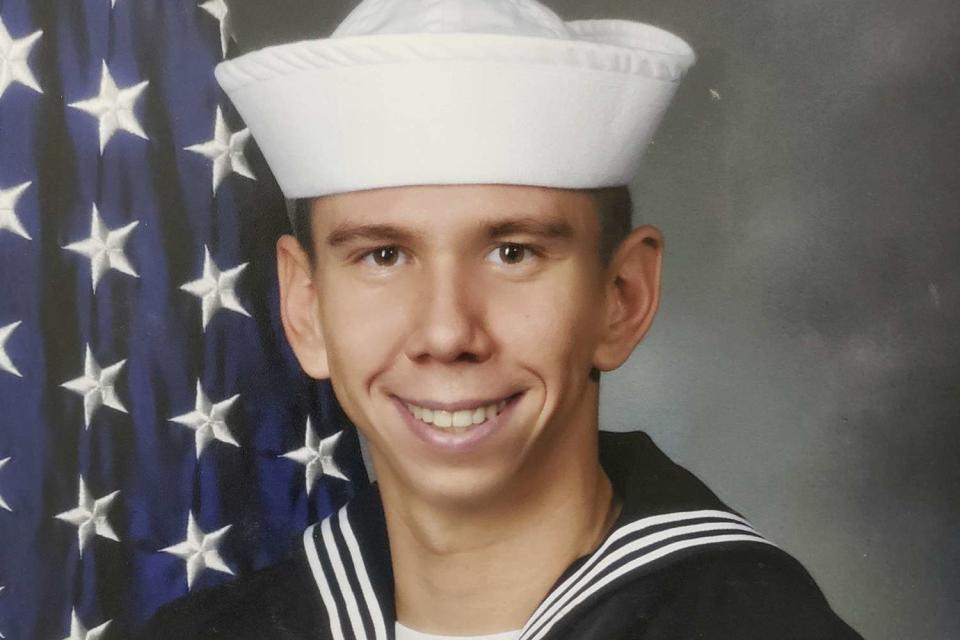
Courtesy Teri Caserta
Brandon CasertaOn June 25, 2018, a pair of Navy officers knocked on Teri and Patrick Caserta’s front door in Peoria, Ariz., to tell them that their 21-year-old son, Petty Officer 3rd Class Brandon Caserta, died by suicide.
“We were devastated,” Patrick tells PEOPLE in this week's issue.
“Burying your child is the worst thing you can ever do,” adds Teri.
The Casertas learned that Brandon's life tragically ended at Naval Station Norfolk in Virginia, where he had been stationed. The loss of their only child shattered the couple’s lives and turned them into crusaders. After the Casertas learned of the years of alleged bullying that Brandon had endured from his commanding officers, as well as his struggle to get mental health treatment, they launched a four-and-a-half-year legislative effort in Washington, D.C., to ensure that the tragedy they had suffered wouldn’t be repeated.
“Suicide is preventable, and we thought our work could make a difference," says Teri, who insists Brandon grew increasingly stressed as his repeated requests to see a therapist were ignored. "Change is coming.”
Their determination to prevent suicide among service members — there were 519 such deaths in 2021 — eventually paid off. A new law known as The Brandon Act allows soldiers, sailors and other military personnel to get psychological help simply by asking for it, without having to go through the bureaucratic chain of command and without retaliation. “If you look at the military, more than half of the population think pursuing therapy is a sign of weakness,” says M. David Rudd, a professor of psychology at the University of Memphis. “The Brandon Act removes the barriers to care as well as the stigma.”
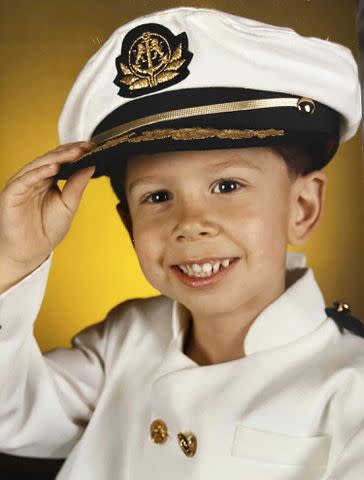
Courtesy Teri Caserta
Brandon at age 2Brandon's Start in the Navy
In 2015, when Brandon’s parents first learned that their bighearted, sports-loving son — who regularly gave away his school lunch money to classmates in need — wanted to join the Navy, they were surprised. Despite his parents’ long-standing wishes that he attend college, Brandon, who was more interested in playing football, running track, swimming and practicing karate than in his academic studies, was intent on becoming a member of the elite Navy SEALs. By May 2016 he had enlisted in the Navy and was in Coronado, Calif., struggling to survive the grueling physical and mental selection process for the military branch’s special-operations force.

Courtesy Teri Caserta
“He was the kindest person we’ve known and our best friend,” says Teri of her son (in 2018, three weeks before his death).“He only had a couple more weeks left, but then he passed out on the beach during training, and the doctor told him he’d broken his leg in three places,” says Patrick, a combat veteran and Navy recruiter who spent 22 years in the service before leaving to attend college.
For more on The Brandon Act and Caserta family's mission, pick up the latest issue of PEOPLE, on newsstands Friday, or subscribe here.
Unable to complete the SEAL program, Brandon began training to become an aviation electrician instead. By October 2016 he had been transferred to Helicopter Sea Combat Squadron 28 in Norfolk— what he would describe as an environment of humiliation and misery.
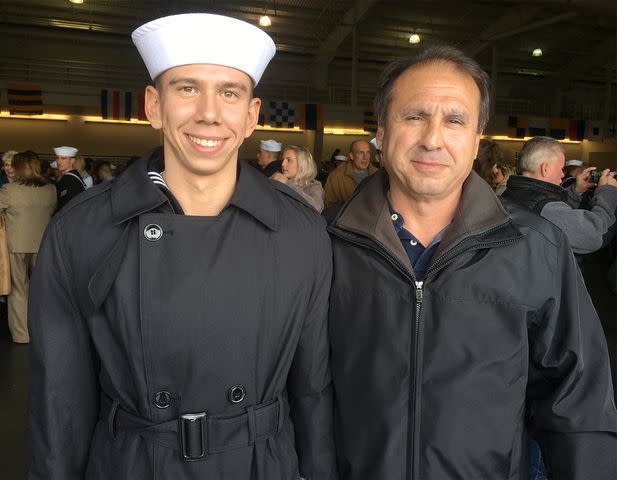
Courtesy Teri Caserta
“His story can help save lives,” says Patrick (with his son after Brandon completed boot camp in 2015).“The bullying and hazing was done by almost everyone in the command,” says Patrick, who says his son was ridiculed for not completing his SEAL training.
While the military declined to address specific allegations, a Navy spokesperson tells People in a written statement, "The loss of any Sailor to suicide is a tragedy and our heartfelt condolences go out to Petty Officer 3rd Class Brandon Caserta’s family, friends, and shipmates."
"Sailors and Marines adhere to core values of honor, courage, and commitment," the spokesperson continues. "Those values are integral to the Department of the Navy’s ability to meet its global mission and to build winning teams based on trust and confidence. Any behavior that erodes our Sailors’ trust has no place in the organization."
"The Navy seeks to ensure that Sailors are able to get mental health support if they need it by removing barriers to access help and reducing stigma around mental health struggles and we are grateful that the Brandon Act will allow our Sailors another avenue to seek help," the spokesperson adds.
'He Was Depressed and Needed Help'
By June 2018 the frustration of not being able to put his training to use — his parents say Brandon was forced to sell candy at the base canteen instead of learning the electrician skills necessary to move up in rank — left Brandon feeling hopeless.
“He told his leadership that he was depressed and needed help,” says Teri. “He was told to ‘suck it up and get back to work.’ ”
An hour before Brandon died on June 25, Patrick, who had grown worried about his son, telephoned one of his senior officers to share his concerns, but they were quickly dismissed, he says.
“That officer ignored everything Patrick said,” recalls Teri. “It was clear he didn’t care about Brandon’s welfare or well-being.”
Ten days later Teri and Patrick received Brandon’s final letter and were devastated by the pain and horror he described. They immediately knew what they needed to do next.
“He asked us to make sure no other service member would ever have to go through what our family had gone through,” says Patrick.

Courtesy Teri Caserta
Teri and Patrick Caserta at the Capitol to watch as legislation was reintroduced in Congress in 2021.Taking Action
While still grieving, the couple decided to attempt to change the way the military responds to soldiers who request mental health services. By August they had fleshed out proposed legislation to help others get the help their son never could, and then they drove to Washington, D.C., to find a member of Congress to sponsor it.
They connected with Rep. Seth Moulton (D-Mass.), who sponsored the bill, and Sen. Mark Kelly (D-Ariz.), a cosponsor.
“This bill is an important piece of Brandon’s legacy,” says Moulton, “one that will save the lives of so many great American heroes.”
It was signed into law by President Joe Biden on Dec. 27, 2021, but it wasn’t until May 5 of this year that the Department of Defense began implementing the policy — a delay the Casertas find frustrating.
“I was in tears of joy,” says Teri, “but we still can’t believe this took so long.”
Still, thanks to Patrick and Teri’s work, now, when military personnel need mental health attention, they just need to say their son’s name—“I’ve got a Brandon Act issue”—to a commanding officer or a supervisor.
"Brandon's legacy of saving lives will forever live on through The Brandon Act and The Brandon Caserta Foundation," his parents — who have also launched a scholarship in his name at Arizona State University — said in a statement in early May. "We are losing far too many to suicide. Suicide is tragic and senseless. It is 100% preventable. This allows our military force to be stronger and more mentally fit."
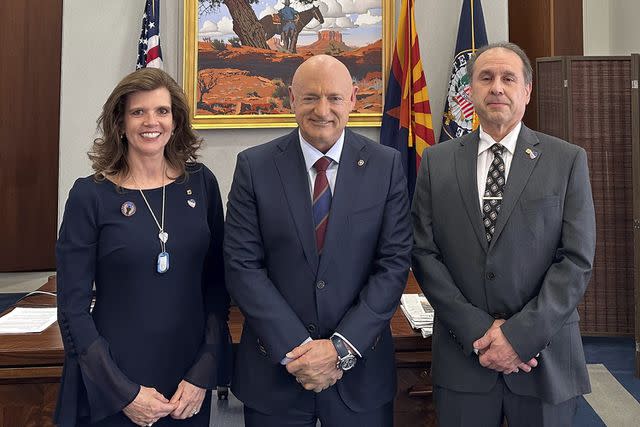
Courtesy Teri Caserta
Teri and Patrick Caserta meeting with bill cosponsor Arizona Sen. Mark Kelly in March.'Lasting, Substantial Change'
"Taking care of our people remains a priority for leaders in the Department of Defense and the Department is committed to making lasting, substantial change to improve mental health and address suicide," Dr. Lester Martinez-Lopez, Assistant Secretary of Defense for Health Affairs, told PEOPLE in a statement after the implementation plan was announced in early May.
"We are diligently working to implement National Defense Authorization Act Fiscal Year 2022 legislation (Section 704), known as the Brandon Act. Once implemented, service members will be able to request a mental health evaluation for any basis, by initiating a referral through a commanding officer or supervisor," the official continued. "The new process will require the commander or supervisor to refer the service member to mental health provider and protect the confidentiality of the service member to the maximum extent practicable in accordance with applicable laws and DoD policy."
Added Martinez-Lopez: "As the Department continues to work to reduce mental health stigma and encourage help seeking, we want to reinforce that there is a full continuum of mental health and wellness support available worldwide. There are specialty and primary care clinics, embedded behavioral health providers within units, and virtual health platforms."
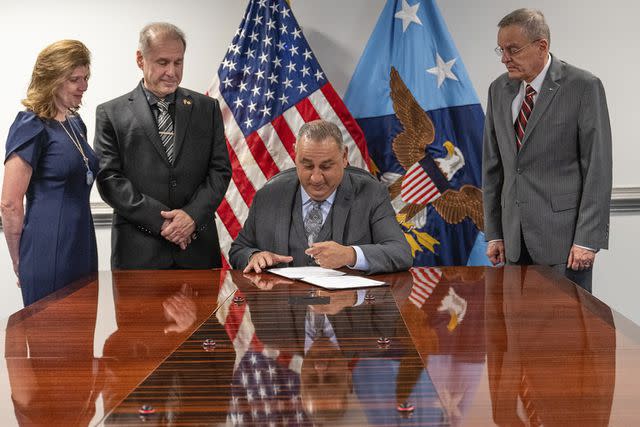
Tech. Sgt. Jack Sanders / Department of Defense
On May 5 Department of Defense Under Secretary Gilbert Cisneros (seated) signed a policy to implement the Brandon Act.“Our goal is zero suicides,” Patrick tells PEOPLE, adding that he's still determined to hold the officers he believes are responsible for Brandon’s death accountable. “But this is a start. And we really believe that Brandon is looking down on us with his big, beautiful smile, telling us that we did good.”
How to Get Help
If you or someone you know in the military needs help, contact the Veterans Crisis Hotline at 800-273-8255, on veteranscrisisline.net, or by texting 838255. Civilians can text “STRENGTH” to the Crisis Text Line at 741-741.
For more People news, make sure to sign up for our newsletter!
Read the original article on People.

